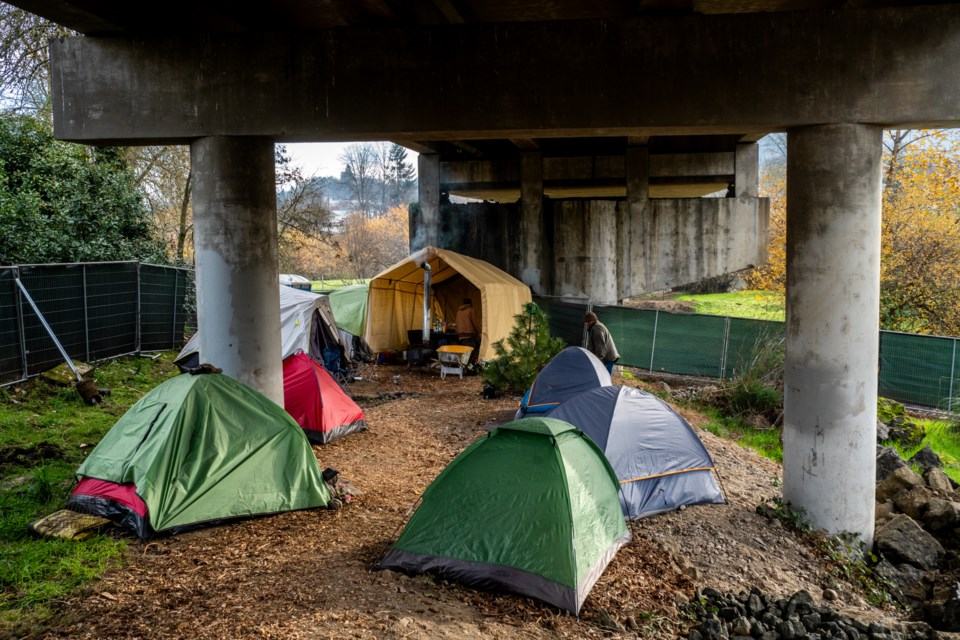Joshua Shaw swears he’s sleeping better than he has in a long time. And that’s saying something.
Shaw is homeless. For the last two months he and his wife Crystal have lived in a tent under the Washington Avenue bridge in Roseburg. It’s often wet and cold, and the noise from cars driving across the bridge overhead is constant.
The Shaws are among a half-dozen people living in Roseburg’s first sanctioned tent city. And while life is far from ideal, they both say it’s better than it had been.
“Before, I was constantly worried about my camp getting raided,” Joshua Shaw said. “Here I don’t stress about that. I actually sleep better here.”
The camp opened three months ago, after receiving the necessary permits from the city. A total of 10 tents are allowed, and the number of residents generally varies from six to 10.
The camp is the brainchild of Bernie Woodard, operations manager for Elk Island Trading Group, LLC, which owns the land under the bridge and Elk Island itself.
Residents had a scare a couple weeks ago when heavy rains caused a nearby waterway to rise, potentially endangering the camp. Woodard and a few camp residents and volunteers spent much of the day removing the old metal fence posts and moving the camp to its current location, under the bridge and at higher ground.
“That weekend was kind of crazy,” Woodard said. “It looked like the water would go up 10 feet or more.”
The new site is safer because it’s under the bridge and away from any tall trees, including cottonwoods, that might shed their branches, he said. And on the street above a bus stop, bike path and sidewalk are nearby, providing good access to residents.
“It makes a huge difference, it really does,” Woodard said. “All these guys here work to make things better.”
On Thursday, work on the new site was ongoing, including putting the final touches on a fence with green privacy netting that surrounds the camp.
Inside the fencing, there were seven tents: five small one-person tents, and two larger multi-person tents, including one that housed the Shaws. A canvas car port with a wood picnic table and benches in it, and a wood burning stove just outside of it, served as the dining quarters.
The camp included two more tables and benches, two portable toilets, a compost barrel, a trash can and a hose hooked up to running water.
A grassy area in the corner was the camp’s “wetlands,” Woodard joked.
Woodard has formerly created a nonprofit organization, Alternative Living Solutions, which will allow him to apply for grants and accept donations.
Some are already trickling in. One woman donated a new generator, another a new dutch oven, and someone else pledged $100 a month, Woodard said. He is glad to see people pitching in, and not just relying on the city to address the situation.
“We want the community to be a part of this,” he said. “Everything helps.”
Woodard received preliminary approval from the city to open a second tent city on land he owns at 216 SE Pine St., between the railroad tracks and Umpqua River.
But he said he wants to hold off on that, and use the Washington Avenue bridge camp as a sort of test model.
“We’re just waiting,” he said. “I want to get this perfected. Right now, it’s all about these guys.”
Mike Lennon, who has been selected as the camp director, said he and others at the camp are learning, just like Woodard.
“In the beginning we had a high turnover rate because people didn’t want to work, didn’t want to follow the rules,” he said. “We don’t have that so much anymore.”
Now, when people leave it’s mostly to move into more permanent housing, he said. That was the case with four people who recently moved out.
“They got off of the streets,” he said.
Crystal Shaw is the camp host, a position she got because she’s a bit of a nudger.
“I’m what they call the camp mom. I’m always on them for something,” she said. “I live here, so I’m able to watch over everything.”
She helps enforce the camp rules: no drinking, no smoking in the tents, and three and a half hours each weekday of work in and around the camp, like raking and other landscaping.
“Making it look nice, like you would your own yard,” Shaw said. “We’re like family.”
Joshua Shaw said in addition to sleeping better he is in better shape physically thanks to the daily yard work, losing four pant sizes. He is also in a better place emotionally because he feels invested in the camp, like he’s a part of something meaningful.
“It gives me some self-worth, instead of feeling like I was worthless,” Shaw said. “It’s been great.”

.jpeg;w=120;h=80;mode=crop)

